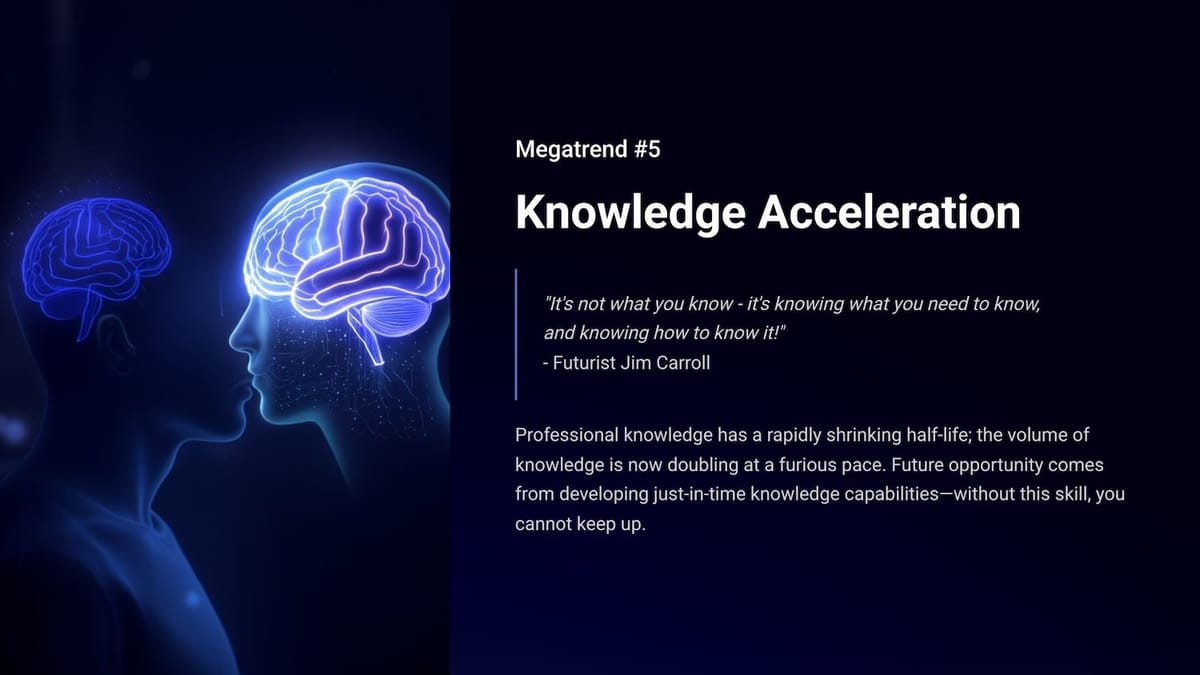"It's not what you know - it's knowing what you need to know, and knowing how to know it!" - Futurist Jim Carroll
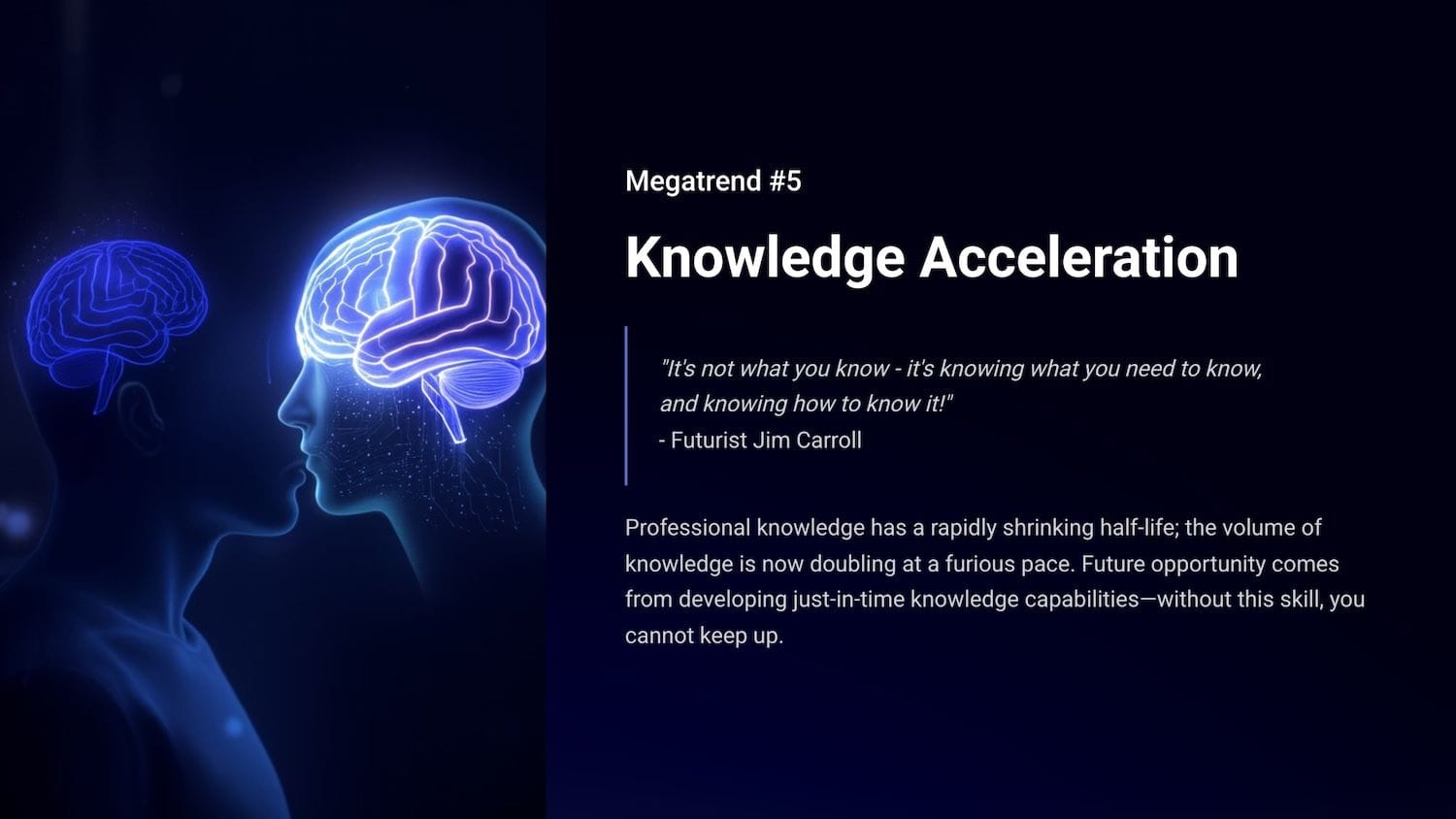
For those of you who are fans of whom we have come to call "Little Guy," here's the essence of today's post.
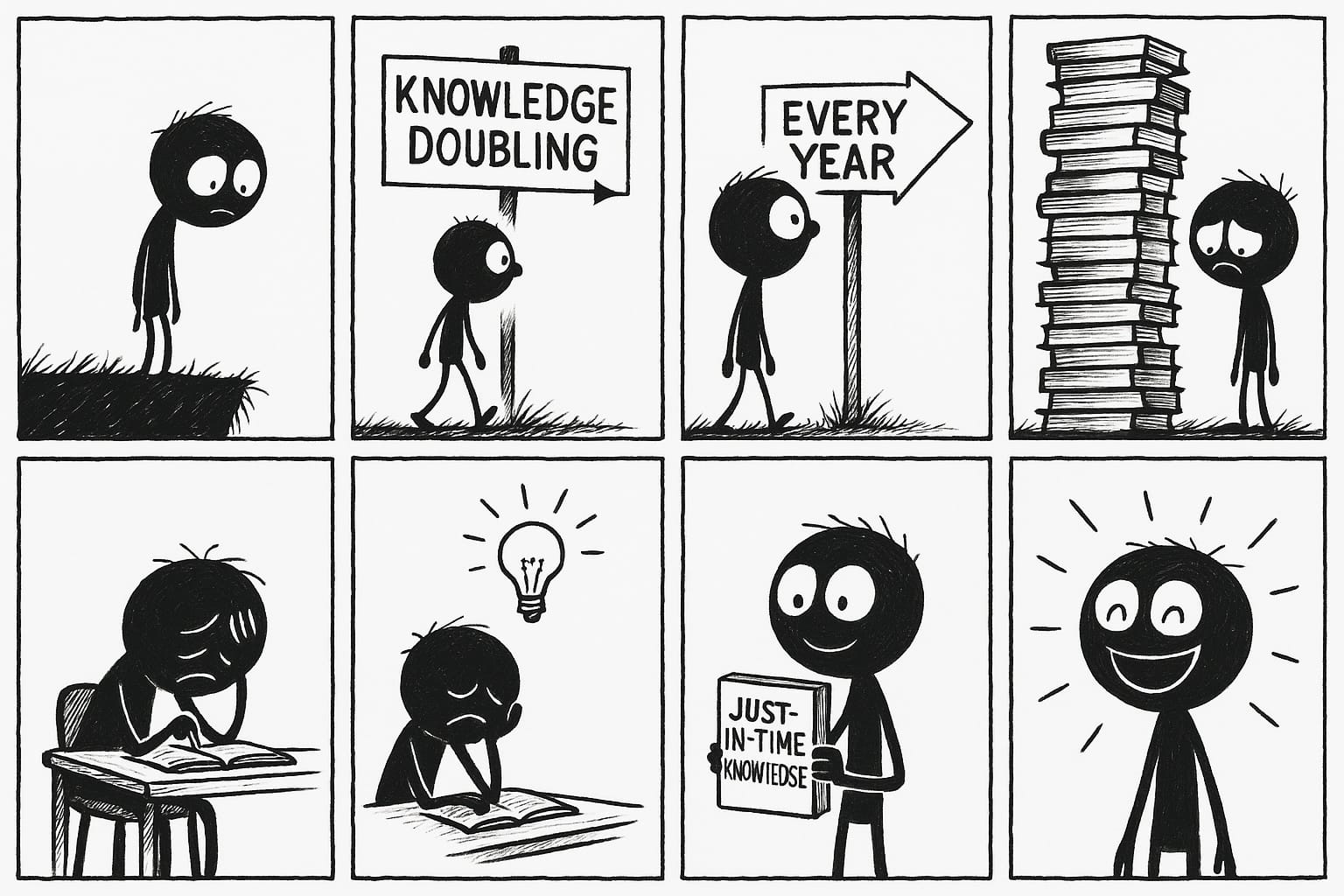
The longer version? Knowledge has a rapidly shrinking half-life; the volume of knowledge is now doubling at a furious pace. Future opportunity comes from developing just-in-time knowledge capabilities—without this skill, you cannot keep up.
You know I've said that before, but let's put a Megatrend spin on this because it is a HUGE trend.
Let's start here. I did a 'research deep dive' on Google Gemini and generated a pretty lengthy report on the future of knowledge. It was based on my original 2023 post on 'knowledge velocity' - which to this day remains one of the most trafficked pages on my Website. I then used gamma.app to pull together this 60-page summary about knowledge trends.
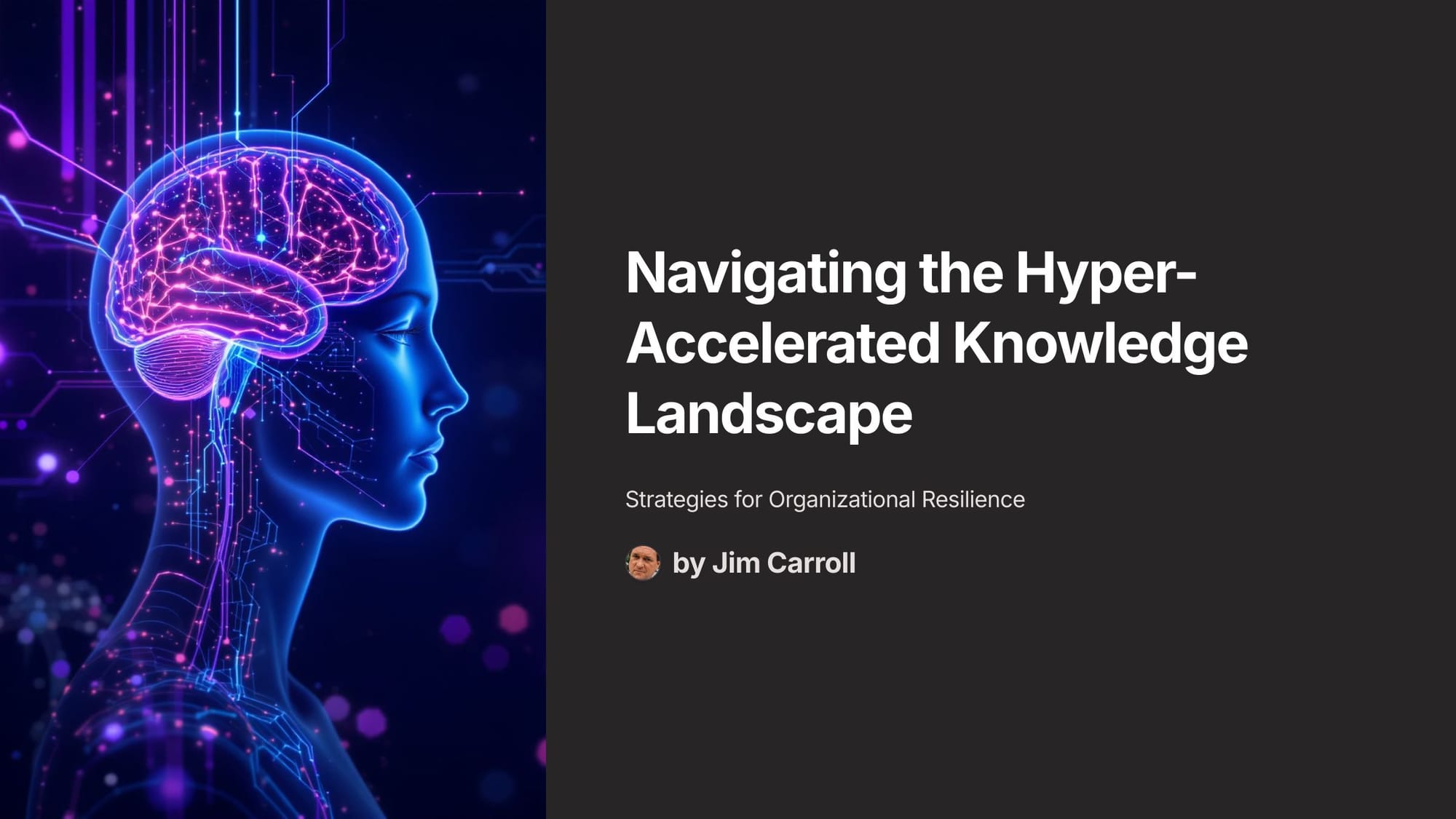
You can find the full report here - it offers up some pretty interesting findings.
So what's the trend all about? It's quite simple - the world is experiencing an unprecedented acceleration in the creation and obsolescence of knowledge, even faster than what I suggested in 2023, largely driven by advancements in AI and the Internet of Things (IoT). This rapid pace presents a dual challenge for organizations: adapting to the quick decay of existing expertise while preparing for entirely new skill sets and job roles. Interestingly, AI, while a primary driver of this acceleration, also serves as a powerful tool for managing it through advanced knowledge discovery, personalized learning, and augmented human capabilities.
In other words, AI is both the problem and the solution.
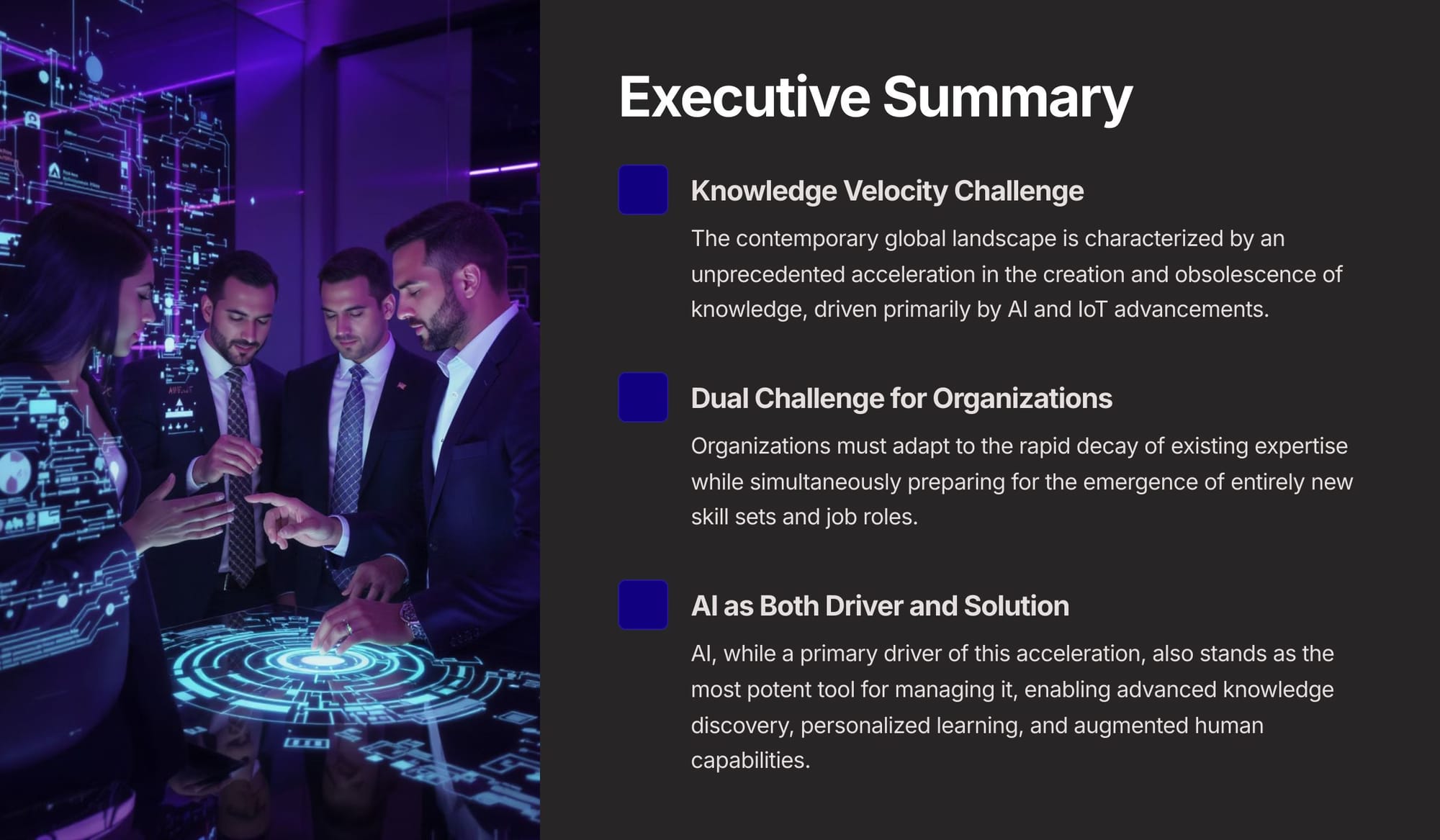
Just to refresh - the speed at which human knowledge doubles has drastically increased over time. In 1900, knowledge doubled approximately every 100 years. By 1945, this rate accelerated to every 25 years, and by 1982, it was every 13 months. Currently, between 2020 and 2025, some estimates suggest that knowledge is approaching a doubling rate every 12 hours.
This acceleration is further compounded by an unprecedented data deluge of new data. Every day, 2.5 quintillion bytes of data are created worldwide, with 90% of the world's data having been generated in the last two years alone. By 2025, global data is expected to reach 181 zettabytes. The challenge has shifted from a scarcity of information to a scarcity of sense-making, making manual processing virtually impossible. IoT devices are significantly amplifying this data explosion, with 15.14 billion devices in 2023, projected to reach 19.08 billion by 2025.
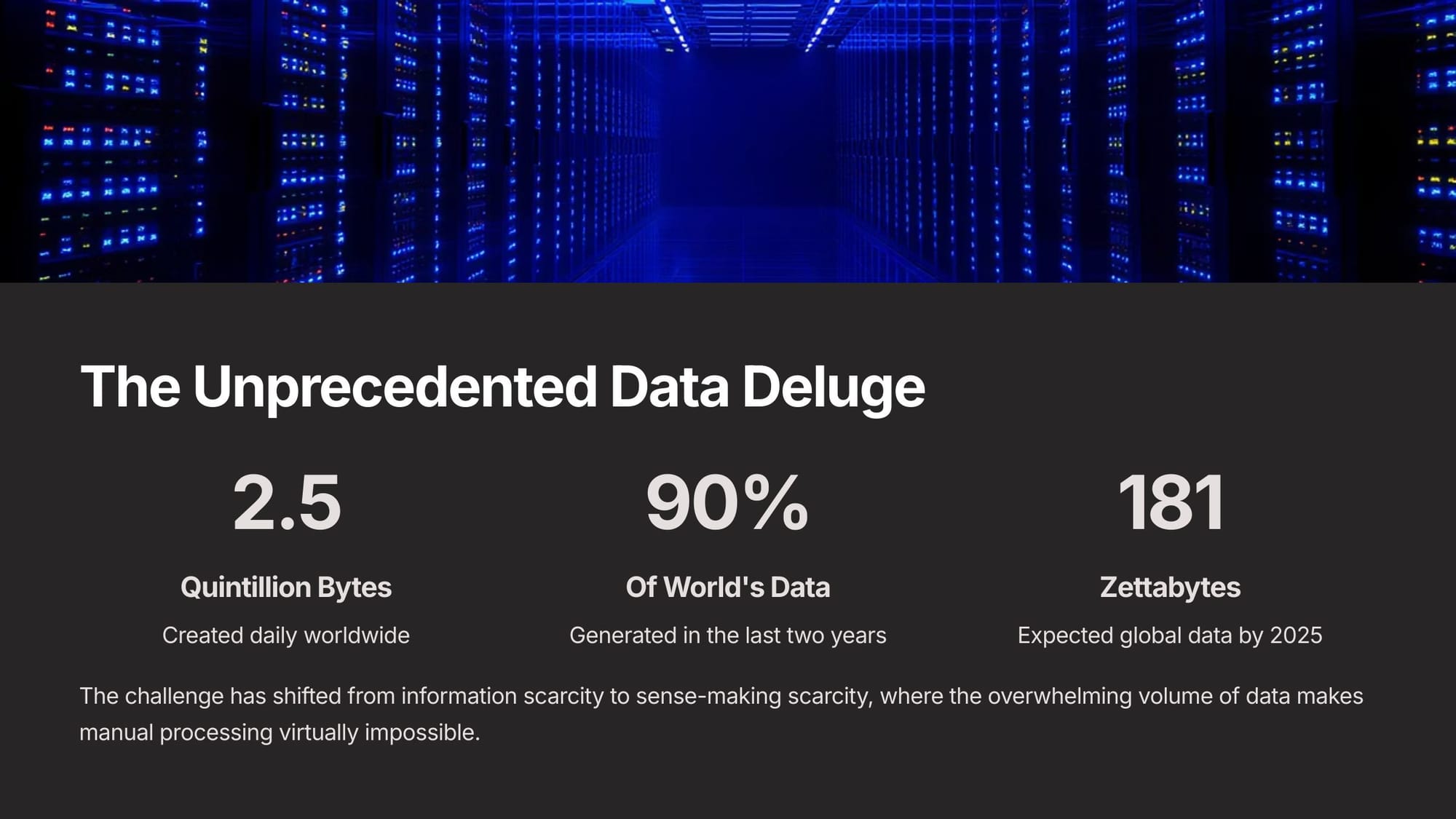
So what does this lead to? The rapid pace of knowledge obsolescence is leading to a significant skills gap.
- Nearly 70% of HR professionals identified a skills gap in their organizations in 2023, up from 55% in 2021.
- Almost 25% of all jobs globally will change within the next five years due to AI and other technologies.
- Employers expect 44% of essential work skills to change within the next five years.
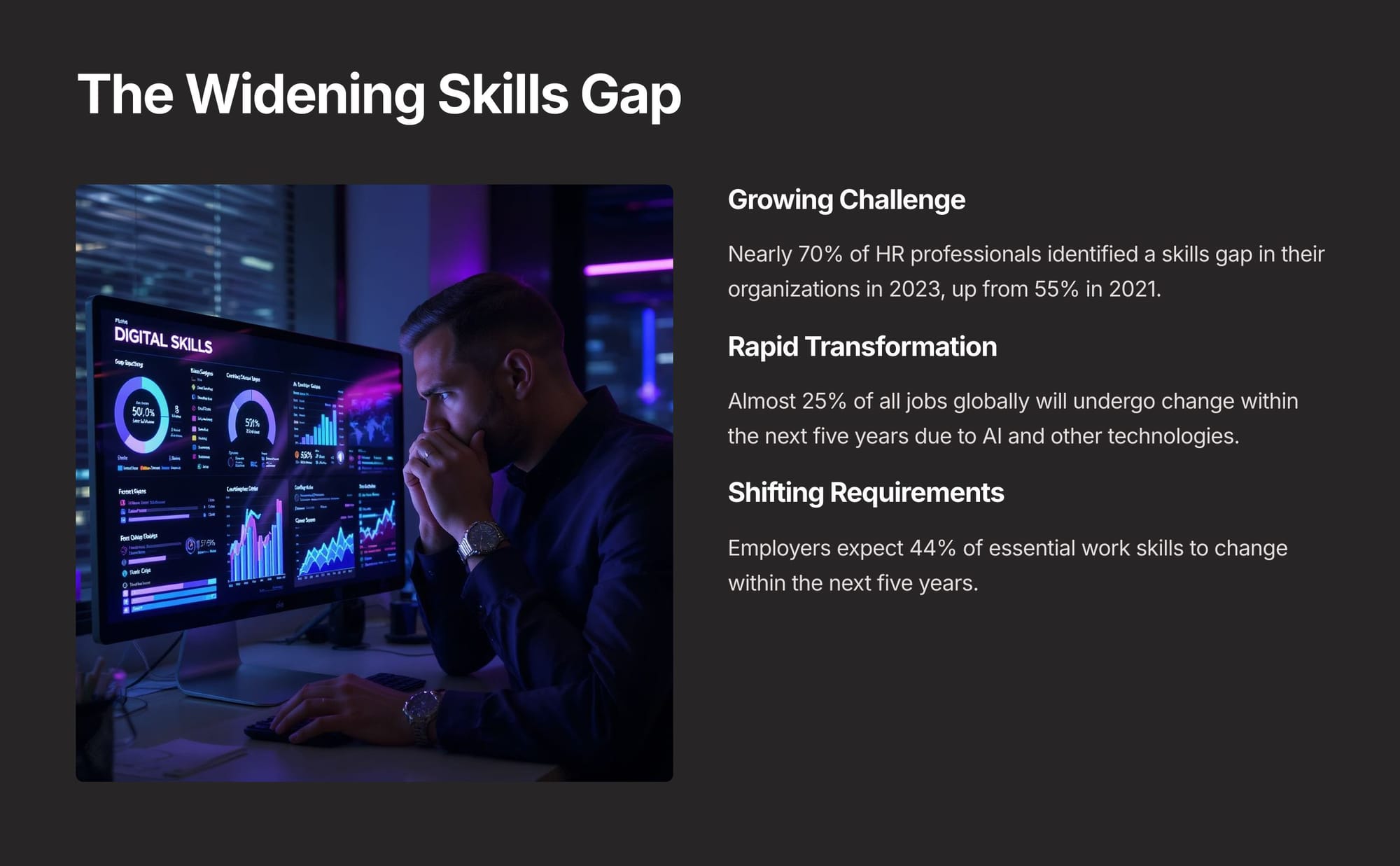
What this means is that the job market is undergoing a fundamental transformation, not just a temporary shortage. One estimate suggests that while 63 million new jobs are projected to be created, 83 million jobs are expected to disappear, resulting in a net loss of 14 million jobs. This is creating an "experience gap paradox" - simply put, a growing shortage of key skills.
- Rising Requirements: 61% of employers increased their experience requirements in the past three years, with most "entry-level" jobs now demanding 2-5 years of prior experience.
- Graduate Perception Gap: 57% of US hiring organizations believe recent college graduates lack the required professionalism, with 38% actively avoiding hiring recent Gen Z graduates.
- AI's Dual Impact: While AI automates many rote tasks, remaining work increasingly involves complex situations requiring nuanced judgment and problem-solving abilities.
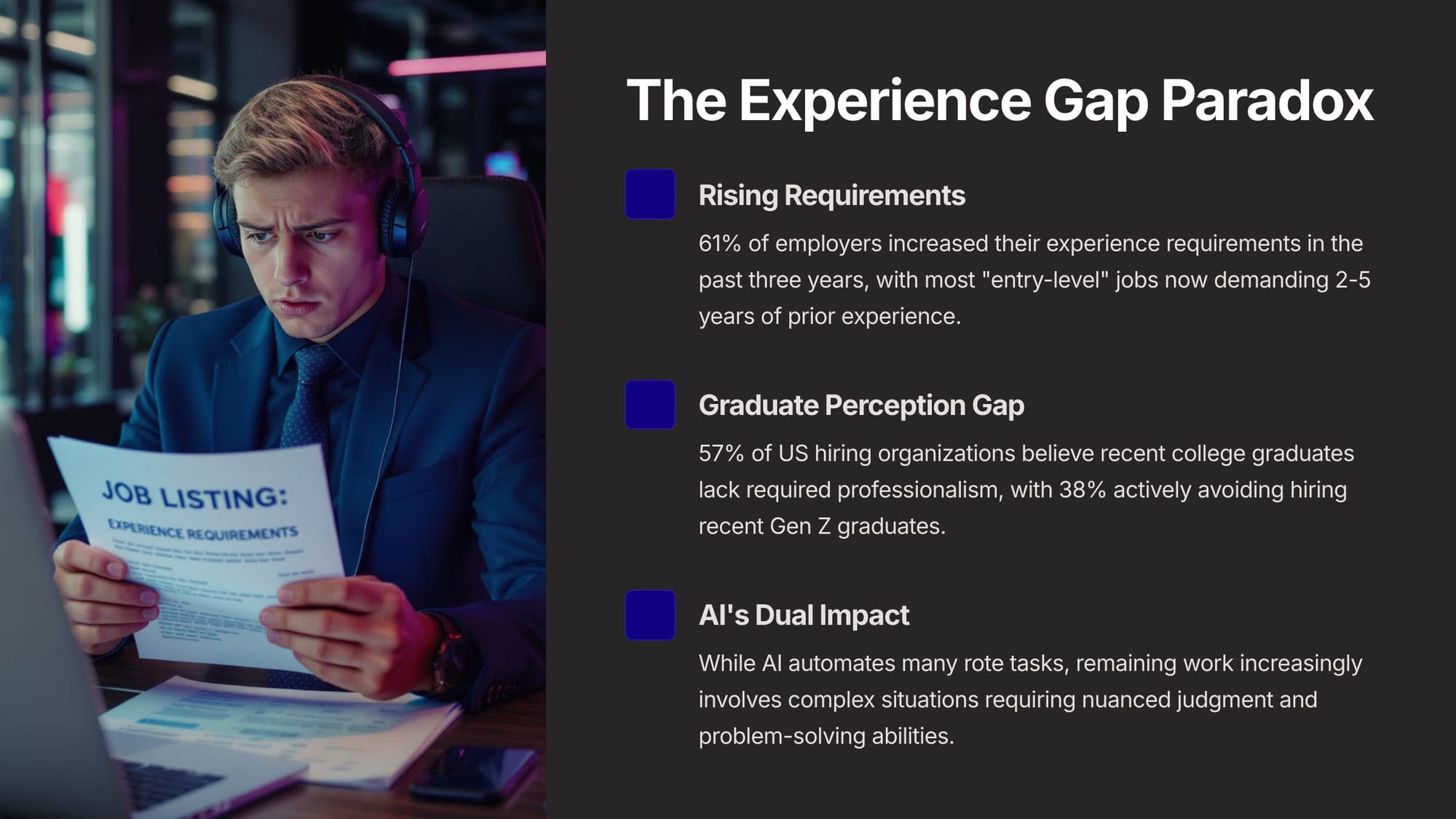
The impact of this knowledge acceleration and AI integration is evident across various sectors. Consider just a few sectors (which, coincidentally, will add to the staffing challenges already faced by these industries in the US in the last few months):
- Healthcare: Medical knowledge, which doubled every eight years before COVID-19, now doubles every 78 days post-pandemic. AI is playing a significant role, with models achieving high accuracy on medical benchmarks and 223 AI medical devices approved by the FDA by 2023. The focus is now on integrating AI-generated insights while understanding their limitations and ethical implications.
- Manufacturing: The industry faces a dual challenge of a declining knowledge base due to an aging workforce and the simultaneous shift towards "smart factories". Approximately 40% of core skills in manufacturing are expected to change within the next 3-5 years.
- Legal Profession: AI adoption in the legal profession reached 30% in 2024, up from 11% in 2023. AI is delivering substantial efficiency gains, such as reducing contract review tasks from hours to seconds and achieving a 99.97% cost reduction in some processes. However, challenges include confidentiality concerns, potential biases, and "hallucinations" from AI. The lawyer's role is evolving from a "knowledge farmer" to an "AI-augmented strategist" and "ethical guardian".
How to cope? Tackle the challenge - organizations must pursue a. number of strategic knowledge changes:
- Continuous Learning Culture: Foster a culture of curiosity and experimentation through:
- Micro-Learning: Small, manageable pieces of information consumed regularly, fitting seamlessly into busy schedules.
- Hybrid Learning: Combining the flexibility of online learning with the human connection of in-person workshops.
- AI-Personalized Paths: Leveraging AI to create tailored learning experiences based on individual needs and preferences.
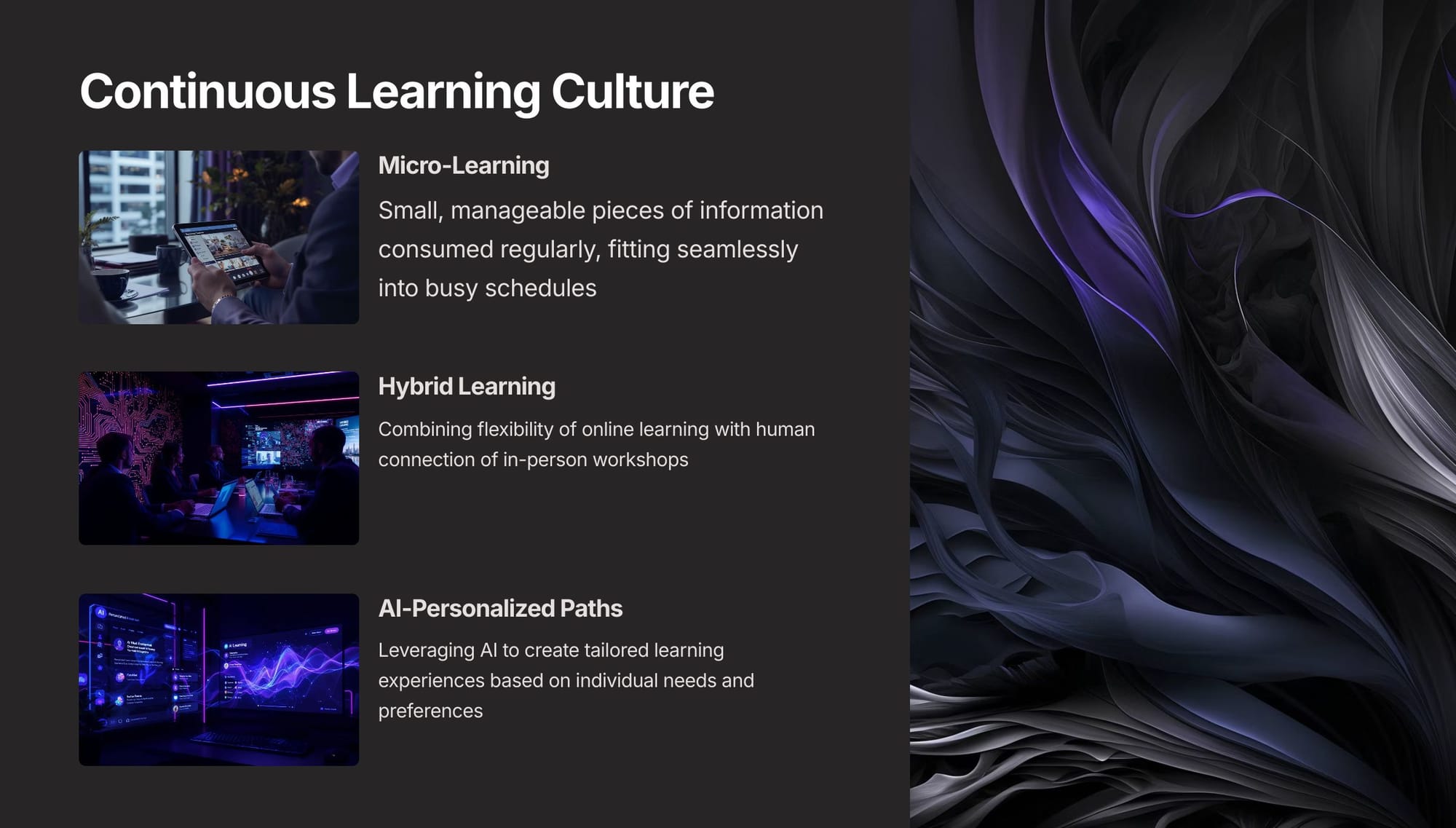
Interestingly, the key idea is that we should all rise to the challenge - Google's deep research suggested the idea of the 'Augmented Professional"
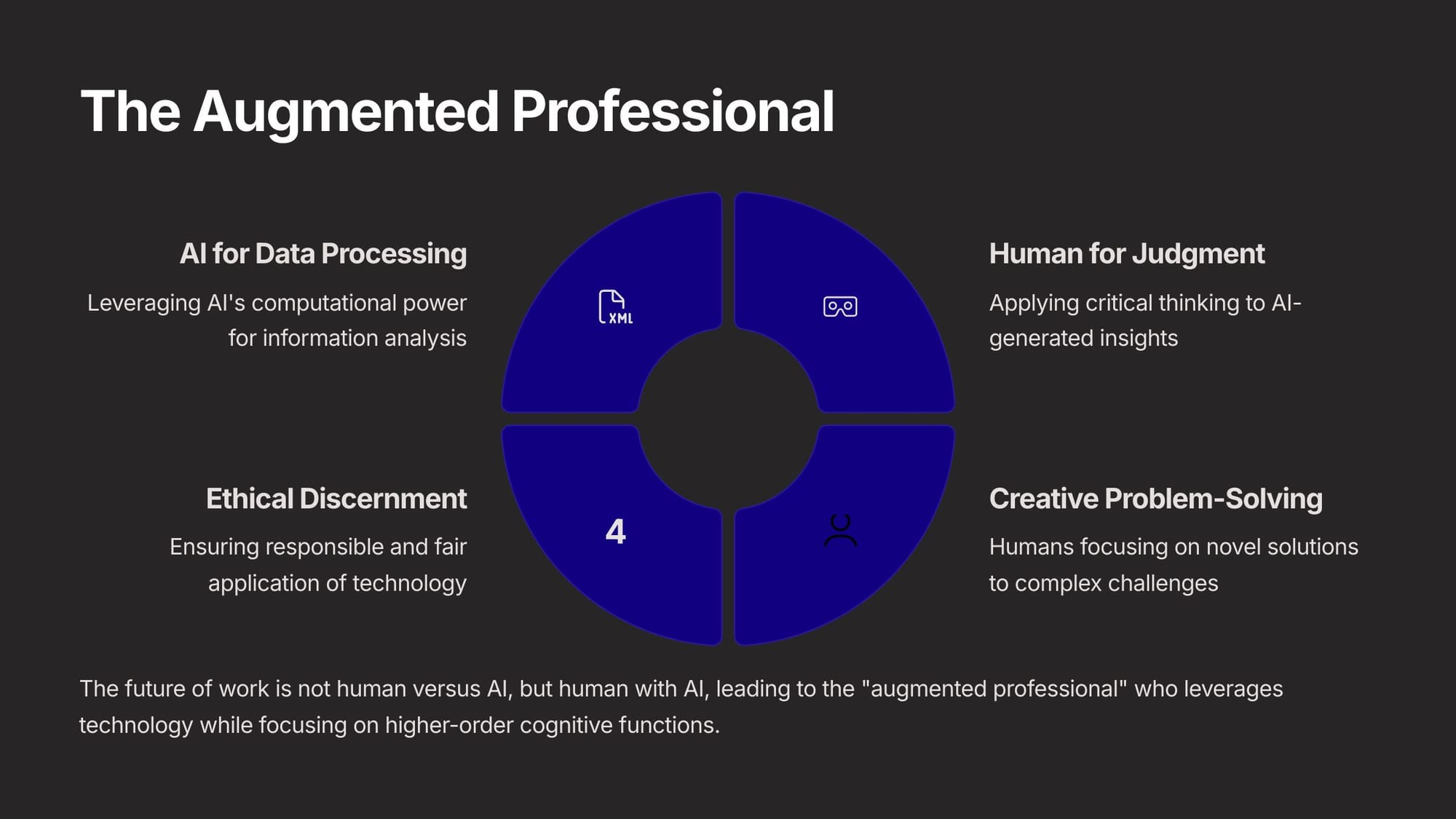
This new skill set will leverage technology while focusing on critical thinking functions, leading to these core skills:
- AI for Data: Leveraging AI's computational power for information analysis.
- Human for Judgment: Applying critical thinking to AI-generated insights.
- Ethical Discernment: Ensuring responsible and fair application of technology.
- Creative Problem-Solving: Humans focus on novel solutions to complex challenges.
This brings me to my key point - consistent since 1997: it's all about just-in-time knowledge: getting the right knowledge at the right time for the right purpose. Except doing it now has just become far more complex!
For you? Organizations that proactively embrace continuous learning, modernize knowledge management with AI, reimagine talent strategies, and embed ethical AI governance into their teams will be the tsunami of information that is headed our way.
Futurist Jim Carroll does a good job at knowing what he doesn't know but knowing how to know it when he has a sudden need to know it.

